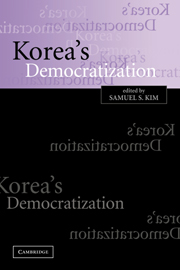Book contents
- Frontmatter
- Contents
- Tables and Figures
- Contributors
- Preface
- Part I A Framework of Analysis
- Part II Consolidation at the Mass Level
- Part III Consolidation at the Civil Society Level
- Part IV Consolidation at the State Level
- 6 Regional Politics and Democratic Consolidation in Korea
- 7 Crafting and Consolidating Constitutional Democracy in Korea
- 8 Security and Democracy in South Korean Development
- 9 The Developmental State and Democratic Consolidation in South Korea
- Bibliography
- Index
8 - Security and Democracy in South Korean Development
Published online by Cambridge University Press: 29 July 2009
- Frontmatter
- Contents
- Tables and Figures
- Contributors
- Preface
- Part I A Framework of Analysis
- Part II Consolidation at the Mass Level
- Part III Consolidation at the Civil Society Level
- Part IV Consolidation at the State Level
- 6 Regional Politics and Democratic Consolidation in Korea
- 7 Crafting and Consolidating Constitutional Democracy in Korea
- 8 Security and Democracy in South Korean Development
- 9 The Developmental State and Democratic Consolidation in South Korea
- Bibliography
- Index
Summary
This chapter explores the causal linkages between two critical variables in the modern development of the Republic of Korea (ROK): security and democracy. Two questions drive this research inquiry. The first is an empirical investigation of the impact of security on the democratization process. In particular, how has the ROK's defense thinking, practice, and institutions helped or hindered the democratization and consolidation process in the 1990s (i.e., during the Kim Young Sam and Kim Dae Jung governments)? The second question is more conceptual in nature. How does the legacy of Korea's military-authoritarianism affect the democratic consolidation process? Although the military as an institution has been rooted out of politics, to what extent does the South Korean political culture still harbor within it a residual affinity for aspects of its authoritarian past?
I emphasize that this is a first foray into this topic. Although there has been voluminous literature on democratic consolidation and on security, there has been relatively little that attempts to understand the explicit causal links between the two in the Korean context.
The chapter reaches two sets of preliminary findings. With regard to the impact of security on the democratic consolidation, I reach a negative finding. Contrary to the conventional wisdom, conditions of “security-scarcity” were not the primary impediment to the democracy process. There is no denying that South Korea's threatening external security environment hindered the democratization process – the North Korean threat often became the justification for authoritarian rule and empowered the military as a political institution, particularly in the 1970s and 1980s.
- Type
- Chapter
- Information
- Korea's Democratization , pp. 201 - 219Publisher: Cambridge University PressPrint publication year: 2003
- 4
- Cited by



